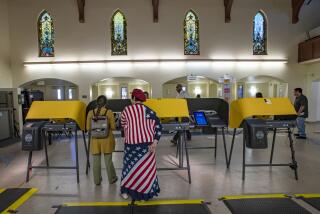Census Takers Prepare to Go to Homes
- Share via
FALLS CHURCH, Va. — Lawrence Dokor worries that people whose visas have expired, or who came to the United States illegally, will not want to open the door when he comes knocking as the man from the census.
Peggy Washington is fearful that homeowners will not believe she is a census worker.
And Susan Kayser wonders whether hostile residents will bully her because she is a woman asking questions that they might not want to answer.
The three are eager, but apprehensive, members of the army of about 500,000 temporary census workers who will knock on 43 million doors starting this week to get answers for the 2000 census from people who have not returned the forms mailed to them.
The people counters--officially called enumerators--will be working in a climate of concern and suspicion, fueled by rising concerns over privacy. “You need to develop your own techniques” of friendly persuasion when you run into resistance, Census Director Kenneth Prewitt told Dokor, Washington, Kayser and three dozen other members of the first training class for enumerators at St. Anthony’s Catholic Church in Falls Church, a Washington suburb with a large immigrant population.
We “are very eager to make certain that people doing the enumeration have a good relationship with their neighbors,” said Prewitt, noting that more than half the people in the training class are bilingual. Their ranks include individuals born in Bolivia, Ghana, Iran, Mexico, Nicaragua and Russia.
The enumerators will work from April 27 until July 7, knocking on doors in the evenings and on weekends when people are most likely to be home in an effort to get the most precise count possible of the U.S. population. The national census, taken every 10 years, is used to reapportion congressional seats and to help determine the distribution of more than $180 billion a year in federal funds. Enumerators are paid $8.25 to $18.50 an hour, depending on the cost of living and the prevailing wages in local areas. The Census pays $14 an hour in Los Angeles and Orange counties, $11 in San Bernardino and Riverside counties and $11.75 in Ventura County.
The Census Bureau mailed approximately 120 million questionnaires to households across the country and had a 65% response rate.
Enumerators were selected from a nationwide pool of 2.5 million people, each of whom passed a test and a background check.
They will make three personal visits and three telephone calls, seeking answers from those who did not mail back their forms or who sent back forms with incomplete answers.
Some residents may be fearful that cooperating with an enumerator “could trigger [Immigration and Naturalization Service] action against them,” Dokor said. “I have to let them know that the census has absolutely nothing to do with immigration, that it is exclusively about counting people,” he said.
“There probably will be some hostility” because people may fear that their privacy is being invaded, Kayser said. “I don’t know if it will be harder or easier for a woman” to get answers from reluctant people,” she said. “Maybe they will be more likely to answer questions if a woman asks them. Or maybe, if they are hostile about the census, they will be more likely to try to bully a woman.”
Washington, another member of the Falls Church training class, is concerned that some residents might not believe she is a legitimate census interviewer. “There may be some folks who are a little fearful,” she said. “They wonder whether you are genuine. They wonder if you are who you say you are.”
Every enumerator will have a special census identification card and carry a black bag emblazoned with a Census 2000 label. Even so, “there will be copycats who will try to take advantage,” Census director Prewitt said in response to Washington’s concern.
The enumerators have strict orders never to ask to enter a home. They will stand in the doorway and ask their questions. Someone claiming to be a census enumerator who asks to come inside a house could be a thief, Prewitt warned.
The census chief referred repeatedly to the absolute privacy of census returns, noting that answers from individuals are never shared with any other government agency and are kept sealed from public disclosure.
“You never read a story about what Elvis answered on his census form after he moved into Graceland,” Prewitt declared.
More to Read
Sign up for Essential California
The most important California stories and recommendations in your inbox every morning.
You may occasionally receive promotional content from the Los Angeles Times.













